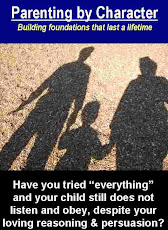Ah!... the Asian obsession with discipline. Its only necessary because Asians have failed to be guides and mentors to their children. Instead they would rather force them into the mould "that has been proven and tested" to produce mindless, unimaginative, obedient and (supposedly) respectful clones - (comment from a listener).
- The mentoree (the one being mentored) is willing and committed to the mentoring process.
- The mentor acts from a position of confidence and authority (not frustration and anger).
- There is a framework by which consistent value-judgement decisions are made.
Does that mean the child then becomes unimaginative and mindless? On the contrary, an obedient child is a happy child. One who has been trained to live in right relationship with others will focus on a "responsibility" attitude rather than that of an "entitlement" mindset. However, we parents must be mindful not to equate authority with a show of force - abusive use of strength and threats are never justified.
What about creativity? Creativity works best when there is a strong value focus. Let's face it - even a bank robber needs creativity! But what distinguishes a robber from a donor? It is their value-judgement framework. This framework I believe is best built within a relationship of respect for authority structures. In other words, once the heart is in the right place, the skills of the hands find its rightful expression. Again, I cannot over-emphasize the need for a parent to be lovingly authoritative and authoritatively loving. To love without authority leads to permissiveness and to exercise authority without love leads to harshness.
In summary, the "cloning" process is vital if it is focused on building values and good character for this forms the foundation by which the exercise of the skills of creativity will find meaning, purpose and direction. Effective parenting at the end of the day is to set the heart of our child in the right place and when it is, then the mentoring experience becomes a pleasant one. To mentor well, we must first teach diligently. Any takers?




